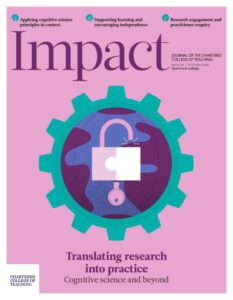Evaluating science trainee teachers’ assessment pedagogy in promoting cognitive learning experience among students
Written by: Adewale Magaji

8 min read
Adewale Magaji, Centre for Thinking and Learning, Institute for Lifecourse Development, FEHHS, University of Greenwich, UK
Theoretically framing the literature
This article reports a section from a large study on trainee teachers’ classroom assessment pedagogy and its impact on the learning and progress of students. Developing and promoting cognitive learning requires experience in the various types of assessment strategy, such as questioning to check prior and current knowledge of students, feedback, and self- and peer-assessments (Black and Wiliam, 1998; Panadero et al., 2016; NFER, 2019). However, effort is required to develop trainee teachers’ assessment competence and literacy (DeLuca et al., 2019; Schildkamp et al., 2020) as a means to improve teaching and learning. Therefore, in promoting cognitive learning experiences, trainees should be aware of those intrinsic (personal) and extrinsic (behaviour and environmental) factors that can promote learning. The social cognitiv
Join us or sign in now to view the rest of this page
You're viewing this site as a guest, which only allows you to view a limited amount of content.
To view this page and get access to all our resources, join the Chartered College of Teaching (it's free for trainee teachers and half price for NQTs) or log in if you're already a member.
- Baadte C and Schnotz W (2014) Feedback effects on performance, motivation and mood: Are they moderated by the learner’s self-concept? Scandinavian Journal of Educational Research 58(5): 570–591.
- Bandura A (1989) Social cognitive theory. In: Vasta R (ed) Annals Of Child Development, Vol 6: Six Theories of Child Development. Greenwich, CT: JAI Press, pp. 1–60.
- Bandura A (1998) Health promotion from the perspective of social cognitive theory. Psychology and Health 13(4): 623–649.
- Black P and Wiliam D (1998) Inside the Black Box: Raising Standards Through Classroom Assessment. London: School of Education, King’s College.
- Burgers C, Eden A, van Engelenburg MD et al. (2015) How feedback boosts motivation and play in a brain-training game. Computers in Human Behavior 48: 94–103.
- Clarke V, Braun V and Hayfield N (2015) Thematic analysis. In: Smith JA (ed) Qualitative Psychology: A Practical Guide to Research Methods. London: SAGE Publications, pp. 222–248.
- DeLuca C, Willis J, Cowie B et al. (2019) Policies, programs, and practices: Exploring the complex dynamics of assessment education in teacher education across four countries. Frontiers in Education 4: 132.
- Education Endowment Foundation (EEF) (2021) Teacher feedback to improve pupil learning: Guidance report. Available at: https://educationendowmentfoundation.org.uk/education-evidence/guidance-reports/feedback (accessed 27 April 2022).
- Forsell J, Forslund Frykedal K and Hammar Chiriac E (2019) Group work assessment: Assessing social skills at group level. Small Group Research 51(1): 87–124.
- Magaji A (2021) Promoting problem-solving skills among secondary science students through problem-based learning. International Journal of Instruction 14(4): 549–566.
- Major T and Mulvihill TM (2018) Problem-based learning pedagogies in teacher education: The case of Botswana. Interdisciplinary Journal of Problem-Based Learning 12(1). DOI: 10.7771/1541-5015.1543.
- National Foundation for Educational Research (NFER) (2019) Assessment 101: A trainee and early career teacher’s handbook to primary assessment in England. Available at: www.nfer.ac.uk/media/3702/assessment_101_a_traineeearly_career_teachers_handbook_to_primary_assessment_in_england.pdf (accessed 22 July 2022).
- Panadero E, Jonsson A and Strijbos J (2016) Scaffolding self-regulated learning through self-assessment and peer assessment: Guidelines for classroom implementation. In: Laveault D and Allal L (eds) Assessment for Learning: Meeting the Challenge of Implementation. Boston, MA: Springer, pp. 311–326.
- Robson C (2011) Real World Research: A Resource for Users of Social Research Methods in Applied Settings, 3rd ed. West Sussex: Wiley.
- Rowley T and McCrudden MT (2020) Retrieval practice and retention of course content in a middle school science classroom. Applied Cognitive Psychology 34(6): 1510–1515.
- Schildkamp K, van der Kleij FM, Heitink MC et al. (2020) Formative assessment: A systematic review of critical teacher prerequisites for classroom practice. International Journal of Educational Research 103: 101602.
1
1
vote
Please Rate this content
Subscribe
Please login to comment
0 Comments
Oldest
Newest
Most Voted
Inline Feedbacks
View all comments










